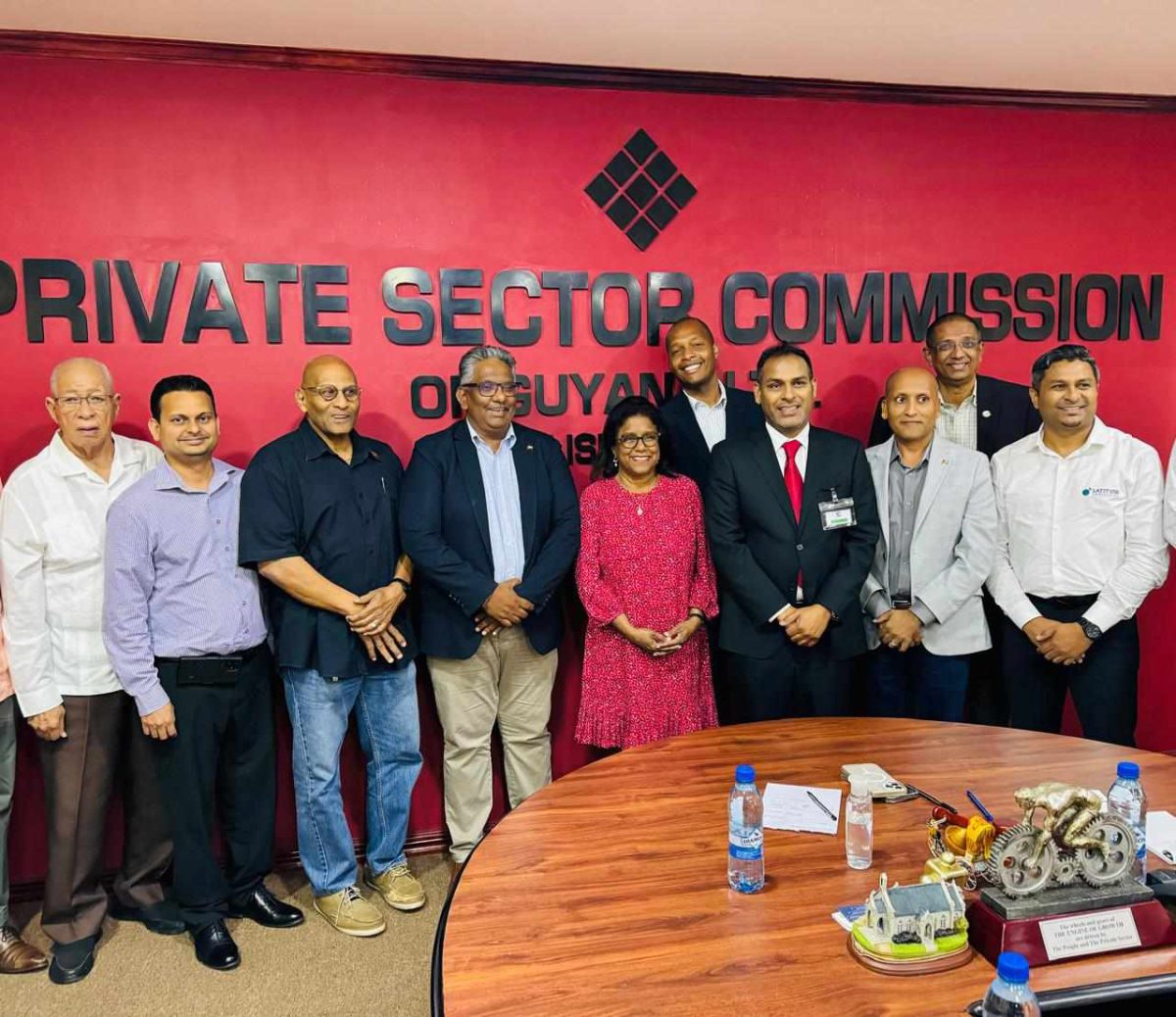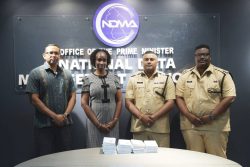-importer failed to follow necessary processes
It was not the state of Trinidad that returned a shipment of milk from Demerara Distillers Limited (DDL) but the importer as he had failed to follow the necessary procedures.
The matter was cleared up yesterday in Georgetown.
“We had an excellent meeting with the Private Sector Commission [PSC] of Guyana and we discussed a number of items that were of concern to Guyana and we able to resolve these amicably and put in place a process that would help us to deal with any further like circumstance,” Trinidad and Tobago Minister of Trade, Paula Gopee-Scoon, told Stabroek News as she exited the PSC office on Waterloo Street yesterday afternoon, following the meeting.
“The milk being returned was a decision of the importer… not the government of Trinidad and Tobago,” she added.
DDL’s Deputy Chief Execu-tive Officer, Vasudeo Singh, also spoke with this newspaper and expressed confidence that the issue would be resolved.
For both DDL and the PSC’s part, they agreed with what the minister said as they fleshed out through discussions that the return of milk was due to misunderstandings with the Trinidadian importer who did not first seek all necessary permits.
“We had a very good meeting this afternoon. We were better able to lay the issues we had on hand and the way forward is very clear. Like the minister said, the importer didn’t do certain things he was supposed to do, but now that we know the processes they need to follow, we will be able to resolve this matter expeditiously. We are very satisfied with the outcome of the meeting,” Singh said.
Asked if the company would be resending milk and is confident it would be accepted, he replied in the affirmative, “Absolutely!”
For the PSC and the Guyana Manufacturing and Services Association (GMSA), the meeting was a positive one.
On Tuesday, DDL called on the government and CARICOM to ensure a level playing field for trade following Trinidad’s rejection of two containers of FDA-approved reconstituted milk the company had exported and the placing of a flavoured-water shipment under an onerous import clearance process.
The value of the shipment of milk was pegged at around US$100,000.
“If you are going to accept, as a norm, a different set of rules and different standards, then we can’t have free trade. It has to be on a common basis. The European Union and the North American Free Trade are all on a common basis. You can’t have a set of rules that an exporter to your market got to go through these hurdles, and then you have ready access to everybody else. It is wrong,” DDL Chairman Komal Samaroo on Tuesday told a hurriedly-summoned press conference.
Samaroo said that the T&T authorities told his company that as part of its approval process, they would have to send inspectors here to check the facility under which the milk is packaged. He said that the company was in discussions about what other processes were needed.
President Irfaan Ali who is currently the Chairman of CARICOM, on Tuesday evening told Stabroek News that he had received complaints from DDL and was actively addressing it. Further, Minister of Foreign Affairs and International Co-operation, Hugh Todd, and Minister of Agriculture, Zulfikar Mustapha, have been charged with examining the issue.
Fully committed
Yesterday, the twin-island Caricom sister country also assured that it is fully committed to intra-regional trade and supports increased imports from this country.
“All Parties agreed that the genesis of the matter arose out of a misunderstanding by the import-er of the specific regulatory requirements for the importation of these products into Trinidad and Tobago,” the Trinidad and Tobago Ministry of Trade said in a statement.
“Minister Gopee-Scoon gave the commitment to DDL that upon receipt of the relevant information, the Government of Trinidad and Tobago would expeditiously process the regulatory requirements for DDL,” it added.
The T&T Ministry of Trade and Industry said that after reviewing the issue it wanted to make clear, “There is no prohibition on the importation of Animal Products into Trinidad and Tobago from any CARICOM Member State including Guyana. However, for these products to be exported to Trinidad and Tobago, countries must be approved by the Ministry of Agriculture, Land and Fisheries (MALF). This is a one-time approval associated with first-time exports; (2) Trinidad and Tobago like every country within CARICOM and the rest of the world follows the generally accepted international standards under the auspices of the World Organisation for Animal Health for the trade in Animal Products. These standards which are meant to ensure the health and safety of consumers are operationalised within domestic law via the Animal (Diseases and Importation) Act.”
“The existing standard for the importation of milk into Trinidad and Tobago [which is identical in Guyana] requires all importers to apply for an import permit from the Animal Production and Health Division (MALF). This application must be made in advance of the products arriving in Trinidad and Tobago and even before items are purchased from overseas exporters; (4) In order for an Import Permit to be issued for ‘first-time’ imports of milk from any country, a Risk Analysis is required to be undertaken by the Chief Veterinary Officer (CVO),” it added.
Explaining the events leading up to the shipment coming back to Guyana, the ministry said that all the processes were communicated to the local importer by the CVO on Friday, April 19, which was the same date an application was submitted on TTBizlinK for an animal permit.
“On Monday 22 April 2024, a consignment of goods which included (i) Milk; (ii) Mineral Waters; and Flavoured Beverages landed in Trinidad and Tobago. Upon arrival in Trinidad and Tobago, the Mineral Waters and Favoured Beverage items were cleared and sent to the premises of the Importer by the Chemistry Food and Drugs Division (CFDD) on the condition that the Importer produces a Free Sale Certificate/Animal Health Permit; and With respect to the Milk Items, the Importer took the decision to return these products to the Exporter in Guyana as it did not possess the requisite regulatory documentation,” the statement said.
With a commitment to resolve the issue and given that Gopee-Scoon and the Permanent Secretary (Ag) of her ministry, Randall Karim, were here for a COTED forum, a meeting was set up and they met with representatives of the Guyana Private Sector Commission (GPSC), led by its Chairman Komal Singh, and senior representatives of DDL, at the offices of the GPSC.
Minister Gopee-Scoon shared with the representatives of Guyana’s private sector, the specific facts and timelines associated with the importation of products from DDL, and they all came to an amicable agreement.
The statement said that DDL Chairman Samaroo, “expressed his profound thanks to Minister Gopee-Scoon for the manner in which the matter will be addressed and indicated that his company will work with the authorities in Trinidad and Tobago to resolve the matter.”
“On conclusion of the meeting, all Parties agreed that the discussions were extremely fruitful and agreed to work in a collaborative manner to strengthen CARICOM trade,” the statement said.









